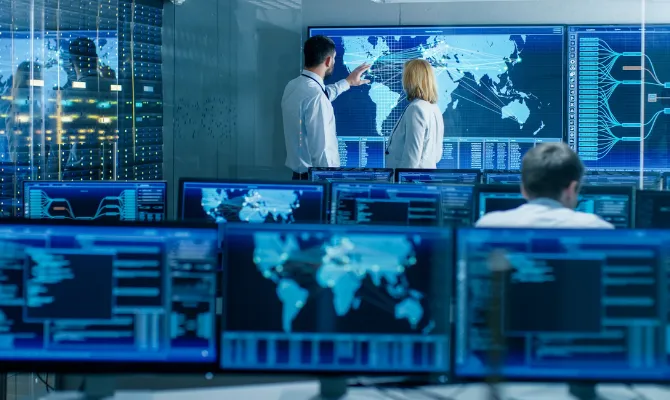The COVID-19 pandemic has catalyzed significant changes across various sectors, prompting businesses in the UAE to rethink traditional operations. Among these transformations is the adoption of remote monitoring and virtual control room setups, allowing operators to manage critical infrastructure from off-site locations. This blog delves into how UAE businesses are embracing this new normal and the implications for control room operations.
The Rise of Remote Monitoring
As the pandemic highlighted the importance of flexibility and resilience, many organizations began transitioning to remote monitoring solutions. This shift was driven by:
– Health and Safety Concerns: With social distancing measures in place, keeping staff safe became a priority. Remote monitoring allowed operators to continue their work without being physically present in control rooms.
– Technological Advancements: The proliferation of cloud computing, IoT devices, and advanced analytics made it easier for businesses to implement remote monitoring systems, enabling real-time access to critical data from anywhere.
– Operational Continuity: Remote control rooms helped ensure that essential services—such as utilities, transportation, and healthcare—could continue functioning seamlessly during lockdowns and restrictions.
How Remote Control Rooms Work
Remote control rooms leverage technology to provide operators with the tools they need to manage operations effectively from off-site locations. Key components include:
– Cloud-Based Platforms: Many businesses have adopted cloud-based control room solutions that facilitate real-time data access and communication. These platforms enable operators to monitor systems, respond to incidents, and collaborate with teams without being on-site.
– Advanced Visualization Tools: Utilizing dashboards and visualization software, operators can analyze data and monitor performance metrics in real time, providing insights that drive decision-making.
– Secure Communication Channels: Ensuring secure communication between remote operators and on-site teams is essential. Virtual private networks (VPNs) and encrypted messaging systems help maintain data integrity and confidentiality.
Benefits of Remote Control Rooms
The shift to remote control rooms offers numerous advantages for UAE businesses:
– Increased Flexibility: Operators can manage critical infrastructure from various locations, allowing for greater work-life balance and adaptability to changing circumstances.
Enhanced Disaster Recovery: Remote setups improve resilience, enabling quick transitions to off-site operations in case of emergencies, technical failures, or other disruptions.
– Cost Savings: Reduced need for physical space and associated operational costs can lead to significant savings, allowing organizations to allocate resources more effectively.
Challenges and Considerations
While the benefits are significant, transitioning to remote control rooms also presents challenges:
– Technological Limitations: Not all organizations have the necessary infrastructure to support remote operations, leading to disparities in capabilities across different sectors.
– Training and Adaptation: Operators must adapt to new technologies and workflows, necessitating ongoing training and support to ensure efficiency and effectiveness.
– Security Concerns: Remote monitoring raises potential cybersecurity risks. Organizations must implement robust security measures to protect sensitive data and maintain operational integrity.
Looking Ahead: The Future of Control Rooms in the UAE
As UAE businesses continue to adapt to the new normal, the future of control rooms will likely involve:
– Hybrid Models: The combination of on-site and remote operations may become the standard, allowing organizations to maintain flexibility while ensuring critical infrastructure is monitored effectively.
– Investment in Technology: Organizations will need to invest in advanced technologies, such as AI and machine learning, to enhance remote monitoring capabilities and improve decision-making processes.
– Focus on Cybersecurity: With the increasing reliance on remote operations, businesses must prioritize cybersecurity to safeguard their systems and data against evolving threats.
Conclusion
The shift towards remote control rooms in the UAE represents a significant adaptation to the challenges posed by the COVID-19 pandemic. By embracing remote monitoring technologies, businesses are enhancing their operational resilience and ensuring the continued management of critical infrastructure. As the landscape continues to evolve, remote control rooms will play an increasingly vital role in shaping the future of operations across various sectors.


